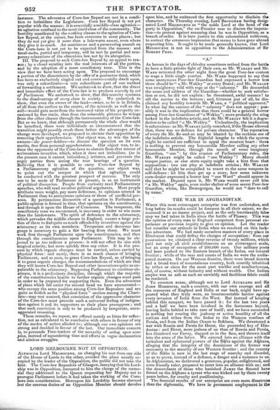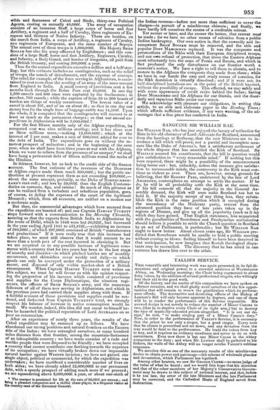THE WAR IN AFGHANISTAN.
WHEN this most extravagant enterprise was first undertaken, and long before its results could be foreseen in all their extent, we de- nounced it as an insane project, and as the only irretrievably false step we had taken in India since the battle of Plessey. This was the opinion of every man in England competent from personal ex- perience or previous inquiry to give an opinion. Let the reader but consider our attitude in India when we resolved on this luck- less adventure. We had made ourselves masters of every place in Hindostan that could defray the charges of occupation : from our possessions we obtained a clear revenue of twenty millions, which paid not only all civil establishments on an extravagant scale, but an army of occupation of 200,000 men. Our military posts had been pushed to the Eastern branch of the Indus, our natural frontier ; while of the seas and coasts of India we were the undis- puted masters. On our Western frontier, there were broad deserts and a broad tract of mountainous country, both scantily inhabited by tribes or clans for the most part warlike and semibarbarous, and, of course, without industry and without wealth. Our Indian empire was as safe as such an unwieldy and factitious fabric could be rendered.
To common sense, although not to Lord AUCKLAND and Sir Joins HODHOUSE, such a country, with our own courage and all the resources of England and India at our back, might have ap- peared what they truly were, an insurmountable barrier against every invasion of India from the West. But instead of keeping behind this rampart, we have passed it : for the last two years and a half we have been involved in the fastnesses beyond, leaving India behind to take care of itself; and we have succeeded in nothing but rousing the jealousy or active hostility of all the nations and tribes from the Indus to the Western confines of Persia, and from the Indian Ocean to Bokhara. We threatened a war with Russia and Persia for Herat, the pretended key of Hin- dostan : and Herat, more jealous of us than of Russia and Persia, has dismissed our Envoy, slapped us in the face, and thrown itself into the arms of the latter. We entered into an alliance with the turbulent and ephemeral powers of the Sikhs against the Afghans, alleging that the integrity of the dominions of the former was necessary to the security of our Western frontier : and the country of the Sikhs is now in the last stage of anarchy and disorder, so as to prove, instead of a defence, a danger and a nuisance to us. In Afghanistan, we dethroned a generous, popular, enlightened, and even friendly ruler, prepared to enter into an alliance with us; and the descendants of those who banished JAMES the Second have forced on the Afghans a tyrant who was kicked out by them twenty years before, for cruelty and pusillanimity. The financial results of our enterprise are even more disastrous than the diplomatic. We have in permanent employment in thst wilds and fastnesses of Cabul and Sinde, thirty-two Political Agents, costing us annually 40,000/. The army of occupation consists of an immense Staff; a large corps of horse and foot Artillery, a regiment and a half of Cavalry, three regiments of Eu- ropean and thirteen of Native Infantry. There are besides, on the march from India, a corps of Artillery, a regiment of Cavalry, two regiments of Europeans, and the same number of Sepoys. The annual cost of these troops is 1,000,000/. His Majesty Saari SOOJAH has also his army officered by Englishmen ; and this con- sists of a large Staff horse and foot Artillery, Engineers, Cavalry, and Infantry, a Body Guard, and hordes of irregulars, all paid from the British treasury, and costing 380,000/. a year.
Thus far the annual expenditure exceeds a million and a half ster- ling; but this estimate includes no contingencies, such as the relief of troops, the march of detachments, and the expense of convoys. The relief, for example, of the force serving in Afghanistan, is ascer- tained to cost more than the sending of an army of the same amount from England to India. A small convoy of provisions sent a few
months back through the Bolan Pass cost 40,000/. In one day 1,200 camels and 800 oxen were captured by the freebooters ; in
another, 700 camels; • while the capture of from 50 to 200 beasts of burden are things of weekly occurrence. The lowest value of a camel is about 10/., and of an ox about Si.; so that in one day our money loss for the single item of baggage-cattle was 14,500/. Upon the whole, it is computed that the contingencies will amount to at least as much as the permanent charges ; so that our annual ex- penditure in Afghanistan will be 3,000,000/. For the first fifteen months only of the Afghan expedition, its computed cost was nine millions sterling; and it has since cost us three millions more,—making 12,000,0001.; which at the interest of 5 per cent. makes a sum of 600,000/. added for ever to the debt of India. The expenditure goes on without the re- motest prospect of reduction ; and in the beginning of the next year, when we shall have been three years at war with the Afghans, whom we went to relieve from the presence of an usurper,* we shall have hung a permanent debt of fifteen millions round the necks of the Hindoos.
In fairness, however, let us look to the credit side of the finance account. The first estimate of the revenues of the Dooranee or Afghan empire made them reach 300,0001.; but the public au- thorities at present represent them as not exceeding 250,0001.,— about the same amount, probably, as the Duke of NORTIIUMBER, LAND'S rent-roll ; and less by 50,0001. than the English Customs- duties on currants, figs, and raisins ! So much of this pittance as can be realized from a turbulent and rebellious population, goes, of course, to defray the expenses of the court of the legitimate Monarch ; which, from all accounts, are neither on a modest nor a moderate scale.
But then, the commercial advantages which have accrued from the expedition are boasted of; and one Captain HARVEY TUCKETT steps forward with a communication to the Morning Chronicle, assuring us that the exports from British India to Afghanistan by the route of Delhi, which in 1840 were but 50,9291., had increased in the year ending April 1841 to 431,8164—exhibitiog an increase of 380,000l.; of which 297,000/. consisted of British "manufactures and productions." If it were really true that this increase had taken place, we must still observe that it would amount to no more than a tenth part of the cost incurred in obtaining it. But we are sceptical as to any possible increase of legitimate com- merce with a country that for two years has been in the last stage of anarchy and disorder—in which pitched battles are of monthly occurrence, and skirmishes occur weekly and daily—to which goods can only be conveyed under the protection of a military escort, and disposed of only within musket-shot of a British encampment. When Captain HARVEY TUCKETT next writes on this subject, we trust he will favour us with his opinion respect- ing the proportion of his increase which consisted of provisions and supplies for the Corps Diplomatique, the nineteen regi- ments, the officers of SHAH SOOJAII'S army, and the numerous followers of all of them now serving in Afghanistan, and which in the previous years had carried their supplies along with them. If a faithful account of those provisions and supplies could be ren- dered, and deducted from Captain TUCKETT'S total, we strongly suspect his balance of increase in native consumption would be small. We wonder, indeed, this idea did not occur to himself be- fore he hazarded the political reputation of Lord AUCKLAND on so poor an extenuation.
After an experience of nearly three years, the results of the Cabul expedition may be summed up as follows. We have abandoned our strong positions and natural frontiers on the Eastern side of the Indus ; we have entangled ourselves, at many hundred miles distance from that frontier, among the mountain-fastnesses of an inhospitable country ; we have made enemies of a rude and warlike people that were disposed to be friendly ; we have occupied a country that cannot contribute one farthing towards the expenses of its occupation ; we have virtually broken down our impassable natural barrier against Western invasion ; we have not gained one single object, political or commercial, for which the expedition was Undertaken; we have sacrificed a considerable number of lives on both sides; we have already added 12,000,0001. to our permanent debt, with a speedy prospect of adding much more if we proceed; we are squandering above 3,000,000/. a year, or about one-sixth of • The usurper is pensioned for life at the rate of 20,0001. per annum ; and being a pleasant companion and a skilful chess-player, is a frequent visiter at the country-seat of the Governor-General- the Indian revenue—before not more than sufficient to cover the charges—in pursuit of a mischievous chimera ; and finally, we have hardly left ourselves the means of a creditable retreat.
Yet sooner or later, and the sooner the better, that retreat mug be made ; for we have no other means of salvation from a public Indian bankruptcy. Our own notion is, that the cowardly and in- competent SHAH SOOJAH must be removed, and the able and popular DOST MAHOMMED replaced. It was the conquests and persecutions of the ikhs with their European disciplined troops, and our own refusal of protection, that drove the Eastern Afghans most reluctantly into the arms of Persia and Russia, and which in fact produced the only disturbance on our frontier worth a moment's notice. We have a right to tell them to abstain, and to restore to the Afghans the conquests they made from them ; while we have in our hands the easy and ready means of coercion, for the Sikh dominion is virtually dissolved ; and if it were not, its half-disciplined battalions are at the point of the British bayonet, without the possibility of escape. This effected, we may safely and with some appearance of credit retire behind the Indus; having DOST MOHAMMKD and his Afghans for our friends, and the disor- derly and rapacious Sikhs under our cannon.
We acknowledge with pleasure our obligations, in writing this article, to an able and elaborate paper in the Bombay Times ; which affords sufficient evidence, if any were wanting, of the ad- vantages that a free press has conferred on India.



























 Previous page
Previous page